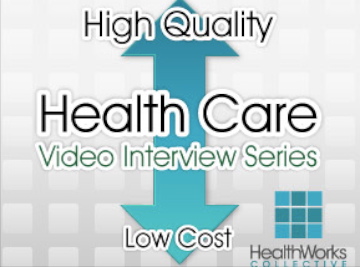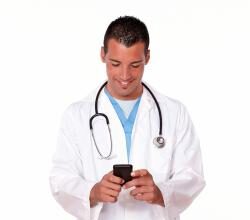
Last week, we listened to Gary Rost explain how Savannah Business Group kept costs down for their members yet achieved a high quality of care. This week, Lou Caputo, CEO of Summerville Medical Center in South Carolina, talks about a new hand hygiene plan that can help lower infection risk for patients.

Last week, we listened to Gary Rost explain how Savannah Business Group kept costs down for their members yet achieved a high quality of care. This week, Lou Caputo, CEO of Summerville Medical Center in South Carolina, talks about a new hand hygiene plan that can help lower infection risk for patients.
In hospitals, hand hygiene is crucial in the prevention of infection which can lead to complications and increases in morbidity. Proper hand hygiene takes minutes but is often overlooked or inproperly performed. GE HealthCare and Summerville Medical Center joined forces and developed and deployed a data-driven system to track hand-washing activity as it relates to patient care.
The GE HealthCare AgileTrac RTLS (Real Time Location System) uses small sensor tags to capture data points which provide a clear picture of clinicians’ hand-washing behavior. The technology allows the hospital to look at the data, seeing the individual workflows and departments and make changes accordingly to always put the patient first. By accurately recording, measuring and reporting hand-washing, Summerville was able to get a detailed record of each patient’s experience. Each caregiver wears a tag counting room entries and exits as well as the use of soap or sanitizer dispensers. Data collected is used to monitor and modify behavior.
Watch and listen as Lou Caputo tells us more:
To see other videos in this series, please go to this page. And if you have a story to tell that can reduce healthcare costs and raise quality of care, please comment below or email me at joan@socialmediatoday.com Thanks!
Video transcript (by TranscriptionStar)
Joan: Hello. I’m Joan Justice from HealthWorks Collective, and I’m here with Lou Caputo, CEO of Somerville Medical Center in South Carolina. Somerville just adopted a novel hand hygiene and that can help reduce the risk of hospital infection by tracking handwashing behavior. Of course, by reducing infection risk, hospitals can raise the quality of patient care and reduce complications, longer, longer hospital stays and increased.
Lou, tell us a little bit about hand hygiene system in place at Summerville, how it started and how it works exactly?
Lou: Sure it’s — and thank you for having me. Summerville Medical Center is part of HDA and HDA has a longstanding relationship with GE Healthcare. For years, we’ve been using GE’s technology and software for called Agility or AgileTrac really to track assets and inventory management, and bed placement and patient management throughout the facility and in dialog with GE we began to ask each other how, how else can we leverage this technology where is there a place in healthcare to use this on a broader level, and at the time a few years ago with healthcare reform, there was the increased attention to hospital required conditions, hospital associated with infections.
And so the discussion began can we use this technology to improve our hand hygiene compliance, and thus reducing the hospitals acquired infections, knowing that there was plenty of studies out there that associated hand hygiene compliance handwash, and simple handwashing with infections. And so we began working with GE to develop that technology, so where we landed, we gone live within the last six months is using RFID technology in real-time locating system technology to monitor caregivers when they interact with the patient whether they wash their hands or not so we — each character within the hospital receives a, an RFID badge that goes along with their hospital ID.
And when they enter and leave our room there’s a signpost in each room that to text back and what that signpost is looking for is a hand hygiene event, so when an individual engages a gel dispenser or a soap dispenser, the technology says Lou Caputo is in the room 203 and washed his hands with a gel wash soap would say that I’m compliance, but what it also does is if I don’t do it, it says that I’m non-compliant.
All that data goes into a database and we have very sophisticated dashboards that we’ve worked with GE to build, then allows us to track it, and we share that data with staff to really, really drive compliance and hold each other accountable and really we can do better.
Joan: Great. How does the — how does the staff, how do the healthcare professionals feel about being monitored?
Lou: That’s a great question. Certainly, there was some anxiety at the beginning really with that Big Brother syndrome it was, can you watch all of the things that I’m doing. Through conversation and transparency and really working with them to develop the technology, we were able to address those concerns. Its been fully embraced by the staff primarily because we’ve shown them what the capabilities are and what it can’t do, so we can or we won’t detect them when they left their shift and walk out to their car, but what’s really important for us is when they’re engaging with patients are they washing their hands, and we show them that data.
Joan: And they’re open about it. They’re completely open with the data yeah.
Lou: Yeah it certainly brings up some great discussion with the staff as well and then their workflows and how one caregiver is different from the other. There’s also that, that peer element to it in that completion. They don’t want to be the lowest person on their unit or in the hospital so we play that towards [Indiscernible] [0:04:43] as well, but we’re also recognizing reward that people could do a great job and thank them for taking it seriously for the patients and for themselves because caregivers can get sick too from the things that their patients can transmit and we don’t want them getting sick and missing work, and we don’t want them taking it home to their kids and to their spouses and passing it along to them, so they — they understand the importance of hand hygiene. They understand that the benefits there are to the patients and to themselves and so they totally embrace it.
Joan: Great. Now, what does the data look like? Has your incidents of handwashing increased? I bet it has.
Lou: Yeah it definitely has. That’s really the benefit of the technology is the data and the granularity of the data that you can get from it. People in hospitals have always washed their hands. The expectation has always been that you do a good job washing your hands, but the data allows you to give so much more information out of it now than the old secret shopper method or had somebody staying in the hallway and check out the piece of paper when the nurse walks in the room and washes their hand.
And some of them we were getting about 80 data points to a month through observation. Now, we get about 80,000 data points a day which is a lot of handwashing going on.
Joan: Sure is.
Lou: And its been great because we — it did give us sophistication in engaging with the staff, but it also allows you to really track how well you’re doing now compared to the past. Now, we don’t have good numbers from the hospital wised because we sort or rolled this out in phases, but each phase we roll it out, we see about a 25% increase or improvement in the compliance.
Joan: That’s great. And what do patients think about these?
Lou: I think they think it’s great. I mean we received great feedback from them. They — patients always want to make sure that they’re getting the best care possible
Joan: Of course, of course.
Lou: And a lot of times its hard to detect from a patient what that means to them, and hospitals get a lot of that information on the backend from the HCAP surveys, but its really hard to get some, some real-time information on a larger scale, but what’s been nice about this is when the staff member enters your room, and they do wash their hands, there’s a beep that goes off as well, and it’s a nice little — it’s a nice little reminder that they’ve done what they’re supposed to do.
I call it a thank you beep. That says thanks for washing your hands. Well, go into a patient’s room four or five times and they hear that beep. They started asking our caregivers, why every time somebody enters the room does — is there a beep? And we shared with them that that is what the technology is and why we’re doing it and then its really to make sure that the patients are kept [Indiscernible] [0:07:51] and they don’t get a hospital associated infection, and they appreciate that because to them that’s right care. It gives them a sense that we’re doing good things to make sure that there, their rooms are always kept clean and that they’re free of infection, so they appreciate it.
Joan: Yeah. That’s great. Thank you so much for letting our readers know about this sophisticated system, and anything that helps lower the risk of infection is so important for patient care. Thanks so much Lou.
Lou: My pleasure thank you.






